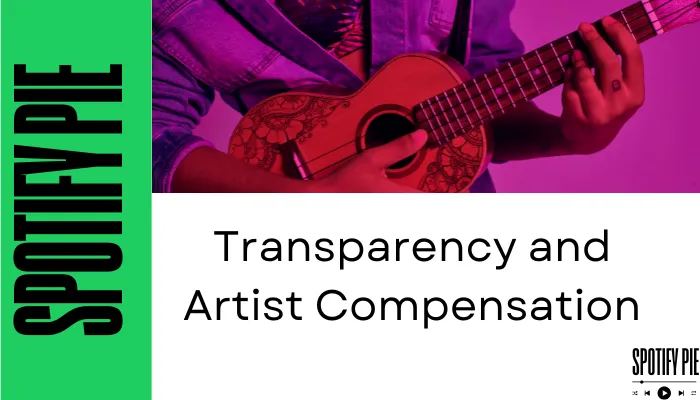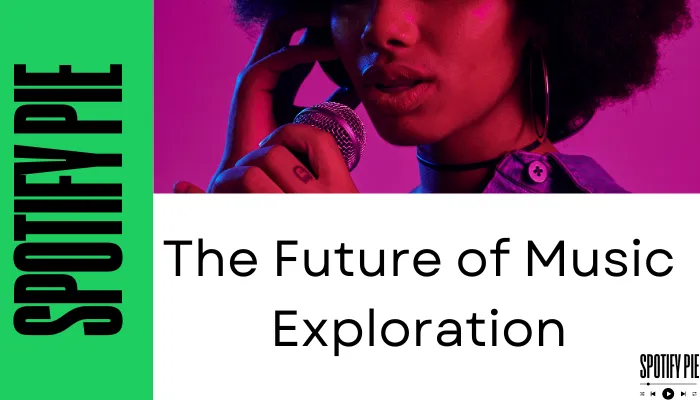This article bubbles on Spotify, is Spotify pie legit? transparency, and influence on the industry of music focusing more on the popular “Spotify Pie” tool.

The music sector has gone through a tectonic shift in recent times. We can no longer afford bulky CD players or meticulously curated records. Streaming services have taken over by storm, giving you millions of songs at your fingertip.
Spotify is one of the key players in this field as it has revolutionized how we listen to music. But with its might comes scrutiny.
A Glimpse into Spotify’s Domain and Spotify Pie legit?
The music streaming industry boasts an enormous number of users led by Spotify Pie legit. There is no denying that this service has an appeal to people. Subscribers get unprecedented convenience- a huge music library that they can access from any gadget be it a phone or laptop.
On top of this, there is the creation of playlists, artist radio stations, and personalized recommendations. But how does Spotify navigate the intricate web of music rights? The answer lies in licensing agreements.
Licensing Agreements
Spotify partners with record labels and artists, securing licenses to distribute their music.
These agreements decide how much artists are paid for each stream such that while details may not always be available in the public domain basic principles follow if a song streams more so does an artist earn more. However, ensuring copyright compliance goes beyond just licensing.
Copyright Compliance
To identify copyrighted material Spotify uses sophisticated systems including matching audio fingerprints against a massive database as well as content ID technology among others. This way they ensure that artists are paid for their work accordingly.
Nevertheless, Spotify has faced legal challenges related to copyright infringement even after these measures were put in place with some musicians claiming a meager share of streamed revenue while others question the accuracy of Spotify’s payment system for royalties.
Transparency and Artist Compensation
Spotify is not simply about legality. For a healthy artist-platform relationship, transparency and accountability are vital.
One of the biggest concerns for musicians is the level of financial transparency in Spotify. Critics argue that Spotify should provide a more detailed breakdown that focuses on artists rather than just some data on royalty payouts.

It is important for artists to know how their streams earn money. Spotify gives them tools and resources that they can use to track streams and earnings as an artist. Nevertheless, there are ongoing criticisms suggesting these need to be simplified and communicated better.
Music industry changes require a corresponding adjustment in Spotify’s transparency approach. Artists need clear, consistent information about their income. Initiatives aimed at simplifying royalty breakdowns and fostering open communication are vital.
The Curious Case of Spotify Pie Legit
However, let’s first address the elephant in the room; “Is Spotify Pie safe?” This third-party website analyzes your listening activity on Spotify and produces a Spotify Pie legit chart showing your favorite genres you have listened to over time such as pop or hip hop.
Is Spotify Pie Legit?
The legitimacy of Spotify Pie legit rests on several pillars:
- Data Security: Since it requires you to log into your Spotify account, ensuring data security is critical here. Make sure that the website uses safe connections along with strict data privacy principles.
- Accuracy of Results: Correct results depend on how the instrument classifies music styles. In order to avoid errors, one is advised to match obtained outcomes with a personal understanding on listening habits.
As with any online tool, caution is advised. Here’s how to ensure a safe experience:
- Check the Website’s Credentials: Ensure that the developer has a good reputation and the site also has an unquestionable reputation.
- Review Data Practices: Comprehend how your data is managed by the website before making connections using your account.
Spotify has without any doubt revolutionized listening patterns; it provides an unmatched experience through its vast collections and innovative features. However, a sustainable music industry would require ongoing discussions on copyright issues, transparency as well as artist payments.
As for the “Is Spotify Pie safe?” tool, it offers a fun way to visualize your listening habits. Be cautious however and mind about your data’s safety first. Finally, Spotify or other tools like “Spotify Pie” depict the intricate relationship between music and technology. By fostering trust and cooperation this partnership can transform our musical experiences forever.
Disclosing Mastery Behind The Spotify Pie
That said, the Spotify Pie legit is not an official feature on Spotify but a tool developed by another party. It connects to your account and analyses all the music you have been listening to for a set duration normally one month.
This data can be represented in pie form with each piece of pie representing genres that are dominant in your music library. There could also be an accompanying list of leading artists whose work falls under specific genres.
Given its appeal among people, many do enjoy sharing it as a happy snap about their musical persona which often leads to discussions and comparisons among friends. It could help you understand subliminal genre preferences as well; hence it’s considered a tool to uncover.
Is The Spotify Pie legit really Safe?
While there is no doubt that this concept is interesting, it raises safety concerns too. Safety issues can be broken down into:
- Third-Party Tool: Being that third-party tools are not created by Spotify, they put users’ data at risk because we do not know who has access to them.
- Data Sharing: To use this tool you would need to give other people the right to see what songs you have listened to so far in your Spotify account.
- Privacy Policy Review: Before connecting your account read through the privacy policy concerning how data is handled by this utility.
Here are some safety tips to keep in mind:
Use Reputable Tools: Look for well-known Spotify Pie legit creators online.
Read Reviews: Read what other users think of its security practices.
Disconnect After Use: Having obtained your Spotify Pie, take off access from the settings of your Spotify account.
Spotify and Your Music Experience
The Spotify Pie raises questions about how Spotify has affected music in the world.
- Impact on Artists: Although it offers a platform for artists to be listened to globally, the payment for streaming per play is quite minimal here.
- User Experience: Even though there is an easy interface with massive databases, some features are restricted to premium users only.
- Competition: Apple Music and Amazon Music as streaming giants compete heavily against each other.
Knowing this will help make sense of the phenomenon of Spotify pie legit among us all.
The Future of Music Exploration
However, it is just a starting point and as such, I feel that although there’s nothing wrong with basing such fun ideas as my music taste on the UGC generated by others don’t you think they should start becoming a bit more creative? Here are some ways to delve deeper into music discovery:
- Explore Curated Playlists: When you are looking for something specific at any time, or even want a soundtrack to match your mood for instance if you are happy or sad, bored or studying then try out these playlists made by talented DJs who really know their stuff which could come handy if you have never used them before!
- Follow Artist Radio Stations: What happens when we listen to our favorite musicians’ radio stations where similar sounds appear?
- Check Out “Discover Weekly”: If I am not mistaken this personalized feature would introduce you to new artists based on your listening habits.
The Spotify Pie legit, in the final analysis, is a fun and harmless way to display your music tastes. However, be careful when you are approaching third-party tools and always think about data privacy.

You must know that Spotify can do so much on its platform for music exploration which makes it a journey of enriching experiences regarding music as it changes every now and then.
The technique involves a vivid pie chart produced by third-party tools that breaks up your listening experience into genre slices as if taking a photo of the kind of music you like. However, with numerous online tools available for this purpose, one may ask; is the Spotify pie genuine or better yet safe?
Revealing The Spotify Pie legit
The Spotify pie is not an official feature of Spotify but rather a creation by independent developers. These tools get access to your Spotify listening data (with your permission) and categorize your most-listened-to artists according to their genres.
What you get will be an attractive-looking pie chart where each slice represents a genre and its size determines how much you listen to it. However, it must be kept in mind that these are 3rd party applications whose accuracy might depend on whichever specific tool you use. Here are some things to consider:
- Genre Classification: Music genres can be subjective. A tool might categorize an artist slightly differently than you would.
- Time Period: Most Spotify Pies reflect your listening habits over the past month. If you’ve recently delved into a new genre, it might be underrepresented.
- Niche Genres: Less popular genres might not be recognized by the tool.
But despite these limitations, the Spotify Pie remains a fun and knowledgeable way to discover your music interests. By sharing this pie on social platforms like Facebook, you can begin dialogues about music with friends or other music lovers.
Is the Spotify Pie Safe?
Being that Spotify pie goes through third-party tools security is a genuine concern. Here are some things you should keep in mind:
- Data Permissions: Before connecting any tool with your Spotify account ensure that you know what data permissions it needs. Ideally, such a tool would only ask for access to your listening history and not personal data.
- Reputation and Reviews: Choose a well-established tool with positive user reviews. Researching the developer and the tool’s security practices is crucial.
- Stay Alert for Phishing Attempts: Do not enter your Spotify login details on an unknown site. Genuine Spotify pie tools will have their users log in via the official Spotify platform.
By following these steps, you can minimize any potential risks and enjoy the fun of creating your Spotify Pie.
Beyond the Spotify Pie legit
Spotify, along with other music streaming providers has changed how we listen to music forever. Now let’s go deep into the larger societal and cultural implications of Spotify:
- Impact on Music Consumption: Streaming services have made music more accessible than ever before. We can now explore a vast library of songs on-demand, fostering a culture of discovery.
- Promoting Diversity and Inclusivity: Spotify offers a platform for a greater variety of artists to access a global audience. This serves to break down barriers and promote underrepresented genres as well as artists.
- Cultural Homogenization Concerns: Some argue that streaming algorithms may prefer mainstream music thereby limiting exposure to diverse genres.
- Artist Payouts: One of the big criticisms against this service is that the amount given to musicians is too low.
These are just some of the complex issues surrounding Spotify’s role in the music industry. Ongoing discussions on artist compensation, data privacy, and algorithmic biases are fundamental as the platform continues to evolve.
Conclusion
The Spotify Pie legit is an illustrative example of how data can be used to understand our listening habits. Below are improvements that could be made by Spotify among other similar platforms:
Research fairer payment models so that artists can be rewarded for their efforts. More openness regarding how algorithms recommend music to users. Enhancing user control over data and ensuring data security measures are robust enough.
By addressing these issues, Spotify remains a significant force in music discovery while creating more sustainable and equitable music ecosystem.
